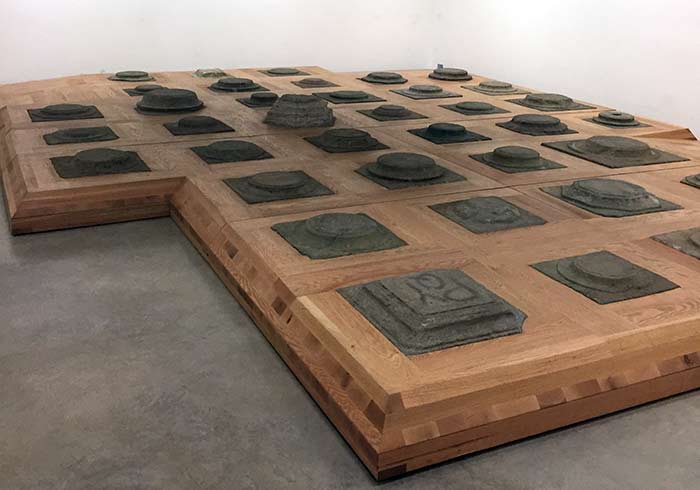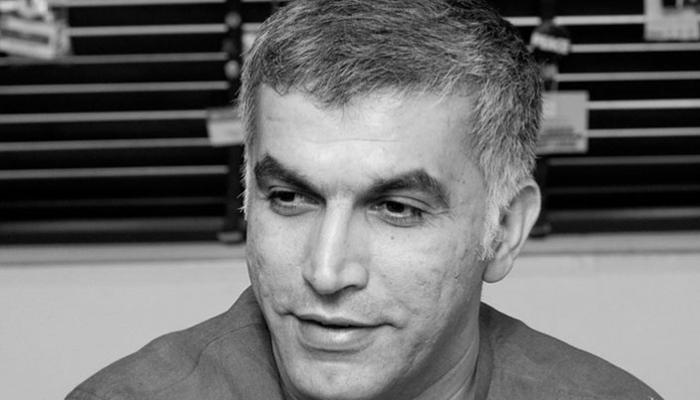7 Nov 2016 | Events
[vc_row][vc_column][vc_column_text]

Ai Weiwei’s Fondation. (Photo: Lisson Gallery)
Index on Censorship’s Julia Farrington will be taking part in an evening of rapid-fire talks, screenings and performances staged on Ai Weiwei’s work, Fondation, a platform made from the ruins of ancient columns. In the open spirit of the Roman forum or Greek agora, a number of speakers will discuss borders, identity and people’s role in politics.
Presented by ArtReview Live at the Lisson Gallery.
Speakers include:
Adam Broomberg, Hands off Our Revolution
Sue Clayton, I am Human – Precarious Journeys
Michaela Crimmin, Culture+Conflict
Julia Farrington, Index on Censorship
Jeremy Hutchison, Artist
Sam Jacob, Architect
Keep it Complex Activist group
Kenan Malik, Writer and broadcaster
John Sauven, Greenpeace
Nigel Rolfe, Performance artist
Legacy Russell, Writer and curator
Fatos Ustek, Curator
Richard Wentworth, Artist[/vc_column_text][/vc_column][/vc_row][vc_row][vc_column][vc_column_text]
When: 6.30pm, Thursday 8 December
Where: Lisson Gallery, 67 Lisson Street London NW1 5BY
Tickets: Free, but registration is required. Contact [email protected]
[/vc_column_text][/vc_column][/vc_row]
31 Oct 2016 | Bahrain, Bahrain News, Middle East and North Africa, mobile, News and features

The trial of prominent Bahraini human rights activist Nabeel Rajab – president of the Bahrain Centre for Human Rights – has been postponed for a fourth consecutive time to enable the country’s high criminal court to hire a cybercrime expert to verify who manages his Twitter account.
A new trial date has been set for 15 December.
“Nabeel Rajab’s continued detention is clearly aimed at silencing him and punishing him for expressing his views. The reopening of his case seems to confirm the political motives behind Rajab’s prosecution. He should be released immediately and all charges must be dropped,” Melody Patry, senior advocacy officer for Index on Censorship, said.
BCHR said in a statement that the latest postponement “throws a light on the lack of evidence of any wrongdoing” by Rajab.
It continued: “Rajab is being prosecuted in relation to tweets and retweets about torture in Jau Prison and the human rights violations in the war on Yemen. The prosecution of Rajab is based on Articles 133, 215, and 216 of Bahrain’s Penal Code over charges of ‘false or malicious news, statements, or rumours,’ ‘offending a foreign country’ (Saudi Arabia), and “offending a statutory body” – for which he may be sentenced to up to 15 years in prison.”
On 13 June 2016, Rajab was taken from his home. He was charged the next day and – on orders of the court – has remained in custody since while awaiting his trial, despite recurring health problems for which he was briefly hospitalised in late June after 15 days in solitary confinement.
His trial was initially due to take place on 2 August but was first delayed until 5 September, and then 6 October, 31 October and now 15 December.
Rajab served two years in jail between 2012 and 2014 for taking part in protests in the country.
28 Oct 2016 | Bahrain, Bahrain Statements, Campaigns, Campaigns -- Featured, Statements

To: Federica Mogherini
High Representative of the European Union for Foreign
Affairs and Security Policy and Vice-President of the
European Commission
European Commission
Rue de la Loi/Wetstraat 200
1049 Brussels
Dear HR/VP Federica Mogherini,
The Government of Bahrain continues to arbitrarily detain Nabeel Rajab, president of the Bahrain Center for Human Rights, founding director of the Gulf Centre for Human Rights and Deputy Secretary General of FIDH, on charges related to his rights to free expression and his work as a human rights defender. We write to ask you to publicly speak out against this clear violation of human rights, and to make clear the European Union’s stance on Rajab’s case and the human rights crackdown in Bahrain.
Rajab’s hearing is scheduled for 31 October when he is expected to be sentenced to up to 15 years in prison. Rajab has already been held in pre-trial detention for 137 days, mainly in solitary confinement. His health has seriously deteriorated as a consequence of poor detention conditions and lack of sustained medical assistance.
Rajab has been detained since 13 June 2016, based on charges related to his comments on Twitter, documenting allegations of torture in Bahrain’s Jau Prison and criticising the escalating humanitarian crisis caused by the Saudi-led coalition airstrikes in Yemen. Rajab faces three charges in relation to these tweets, including “defaming a statutory body,” “offending a foreign country,” and “disseminating false news in a time of war,” for which he faces up to 15 years in prison.
On 4 September, the New York Times published Rajab’s “Letter from a Bahraini jail”, addressed to the US authorities. In it, he criticised his country for being one “that punishes its people for thinking, that prevents its citizens from exercising their basic rights.” The following day, on 5 September, Bahrain’s Public Prosecutor charged Rajab with “intentionally broadcasting false news and malicious rumours abroad impairing the prestige of the state,” which carries an additional one-year prison term if he is convicted.
Rajab’s case has sparked international outrage from government officials like the spokesperson of the US Department of State, UN Secretary-General Ban Ki-Moon, and members of the EU Parliament who have all denounced the arrest of Rajab. Whilst we appreciate these efforts, we reiterate our deep concerns over his health and freedom.
We, the undersigned NGOs, believe Rajab is being targeted as a human rights defender by the Bahraini authorities in an attempt to silence all forms of dissent and suppress freedom of expression in the kingdom. All charges against Rajab are in violation of his fundamental human rights – in particular the right to freedom of expression.
In light of the alarming developments in Rajab’s case, who could be sentenced to 15 years in prison on 31 October, we urge you to dispatch an official delegation to the Kingdom of Bahrain, to expressly address EU concerns about the human rights situation in Bahrain, and to support the release of Rajab, and of all other human rights defenders imprisoned in Bahrain.
Rajab’s sentencing is the latest in a series of Bahraini government actions restricting civil society space. The government penalises criticism and human rights work as criminal activities, and Rajab’s prosecution aims to silence the last remaining voice in Bahrain, as well as to instill a culture of fear and impunity. It follows the dissolution of Al-Wefaq, the largest political party in the country, by the Ministry of Justice, the prosecution of over 60 Shia clerics for protesting since June, and the imposition of travel bans against around 20 human rights activists, ahead of UNHRC sessions in June and September this year.
Rajab has suffered for his human rights activism since 2011, including prison sentences between 2012-14 and in 2015. In 2014, the prosecution imposed a travel ban on him after his return from an advocacy trip in Europe, where he visited the UNHRC in Geneva, the European Parliament in Brussels, and other European capitals. This posed a heavy restriction on his human rights work.
Rajab’s comments on Twitter, documenting torture in Bahrain’s Jau Prison and criticising the escalating humanitarian crisis caused by the Saudi-led coalition airstrikes in Yemen led to his arrest on 2 April 2015. Authorities released him on 13 July 2015 when he received a royal pardon during Ramadan for his previous six-month sentence, but prosecutors did not close the cases and ordered his re-arrest on 13 June 2016.
We urge you not to remain silent in the face of gross violations of basic human rights.
We look forward to your reply.
Signatories,
Aabdulnabi Alekry, Bahrain Human Rights Organisation
Americans for Democracy & Human Rights in Bahrain
Bahrain Center for Human Rights
Bahrain Institute for Rights and Democracy
Bahrain Press Association
Bahrain Youth Society for Human Rights
Cairo Institute for Human Rights Studies
Canadian Journalists for Free Expression
CIVICUS
English PEN
European – Bahraini Organisation for Human rights
European Center for Democracy and Human Rights
Freedom House
Front Line Defenders
Gulf Centre for Human Rights
IFEX
Index on Censorship
International Media Support
International Service for Human Rights
Lawyers’ Rights Watch Canada
No Peace Without Justice
RAFTO
REDRESS
Salam for Democracy and Human Rights
Vivarta
11 Oct 2016 | Digital Freedom, Magazine, Volume 45.03 Autumn 2016
[vc_row][vc_column][vc_column_text]

CREDIT: ra2studio / Shutterstock
Securing your connection
Activists in countries where the web is heavily censored and internet traffic is closely monitored know that using a virtual private network or VPN is essential for remaining invisible.
A VPN is like a pair of curtains on a house: people know you are in but cannot see what you are doing. This is achieved by creating an encrypted tunnel via a private host, often in another country, through which your internet data flows. This means that anyone monitoring web traffic to find out persons of interest is unable to do so. However, the very fact that you are using a VPN may raise eyebrows.
An increasing number of VPNs promise truly anonymous access and do not log any of your activity, such as ExpressVPN and Anonymizer. However, access to some VPN providers is blocked in some countries and their accessibility is always changeable.
Know your onions
One of the internet’s strengths is also one of its weaknesses, at least as far as privacy is concerned. Traffic passes over the internet in data packets, each of which may take a different route between sender and recipient, hopping between computer nodes along the way. This makes the network resilient to physical attack – since there is no fixed connection between the endpoints – but also helps to identify the sender. Packets contain information on both the sender’s and recipient’s IP address so if you need anonymity, this is a fatal flaw.
“Onion” routing offers more privacy. In this, data packets are wrapped in layers of encryption, similar to the layers of an onion. At each node, a layer of encryption is removed, revealing where the packet is to go next, the benefit being that the node only knows the address details of the preceding and succeeding nodes and not the entire chain.
Using onion routing is not as complicated as it may sound. In the mid-1990s, US naval researchers created a browser called TOR, short for The Onion Routing project, based on the concept and offered it to anyone under a free licence.
Accessing the dark web with the Tor browser is a powerful method of hiding identity but is not foolproof. There are a number of documented techniques for exploiting weaknesses and some people believe that some security agencies use these to monitor traffic.
Put the trackers off your scent
Every time you visit a popular website, traces of your activity are carefully collected and sifted, often by snippets of code that come from other parts of the web. A browser add-on called Ghostery (ghostery.com) can show you just how prevalent this is. Firing up Ghostery on a recent visit to The Los Angeles Times website turned up 102 snippets of code designed to track web activity, ranging from well-known names such as Facebook and Google but also lesser known names such as Audience Science and Criteo.
While some of this tracking has legitimate uses, such as to personalise what you see on a site or to tailor the ads that appear, some trackers, particularly in countries where there are lax or no rules about such things, are working hard to identify you.
The problem is that trackers can work out who you are by jigsaw identification. Imagine you have visited a few places on the web, including reading an online article in a banned publication and then flicking through a controversial discussion forum. A third-party tracker used for serving ads can now learn about this behaviour. If you then subsequently log into another site, such as a social network, that includes your identity, this information can suddenly be linked together. Open-source browser extensions such as Disconnect (disconnect.me) offer a way to disable such trackers.
Use the secure web
A growing number of popular websites force visitors to connect to them securely. You can tell which ones because their addresses begin with https rather than http. Using https means that the website you are visiting will be authenticated and that your communications with the site are encrypted, stopping so-called man-in-the-middle attacks – where a malicious person sits between two people who believe they are communicating directly with each other and alters what is being communicated. Google, as well as using https for both Gmail and search, is also encouraging other websites to adopt it by boosting such sites up the search rankings.
Rather than remembering to check you are using https all the time, some people employ a browser extension created by the Electronic Frontier Foundation and the Tor Project called HTTPS Everywhere to do it for them. It is available for Chrome, Firefox and Opera and forces browsers to user https versions of sites where available.
Hide your fingerprints
Traditional identification methods on the web rely on things like IP addresses and cookies, but some organisations employ far more sophisticated techniques, such as browser fingerprinting. When you visit a site, the browser may share information on your default language and any add-ons and fonts you have installed. This may sound innocuous, but this combination of settings may be unique to you and, while not letting others know who you are, can be used to associate your web history with your browser’s fingerprint. You can see how poorly you are protected by visiting panopticlick.eff.org.
One way to try to avoid this is to use a commonly used browser set-up, such as Chrome running on Windows 10 and only common add-ins activated and the default range of fonts. Turning off Javascript can also help but also makes many sites unusable. You can also install the EFF’s Privacy Badger browser add-on to thwart invisible trackers.
Mark Frary is a journalist and co-author of You Call This The Future?: The Greatest Inventions Sci-Fi Imagined and Science Promised (Chicago Review Press, 2008)
This article is from the Autumn issue of Index on Censorship Magazine. You can order your copy here, or take out a digital subscription via Exact Editions. Copies are also available at the BFI, the Serpentine Gallery, MagCulture, (London), News from Nowhere (Liverpool), Home (Manchester), Calton Books (Glasgow) and on Amazon. Each magazine sale helps Index on Censorship continue its fight for free expression worldwide.[/vc_column_text][/vc_column][/vc_row][vc_row][vc_column][vc_custom_heading text=”From the Archives”][vc_row_inner][vc_column_inner width=”1/3″][vc_single_image image=”90642″ img_size=”213×289″ alignment=”center” onclick=”custom_link” link=”http://journals.sagepub.com/doi/pdf/10.1080/03064220008536724″][vc_custom_heading text=”Anonymous now” font_container=”tag:p|font_size:24|text_align:left” link=”url:http%3A%2F%2Fjournals.sagepub.com%2Fdoi%2Fpdf%2F10.1080%2F03064220008536724|||”][vc_column_text]
May 2000
Surfing through cyberspace leaves a trail of clues to your identity. Online privacy can be had but it doesn’t come easy, reports Yaman Akdeniz.
[/vc_column_text][/vc_column_inner][vc_column_inner width=”1/3″][vc_single_image image=”89179″ img_size=”213×289″ alignment=”center” onclick=”custom_link” link=”http://journals.sagepub.com/doi/pdf/10.1080/03064220701738651″][vc_custom_heading text=”Evasion tactics” font_container=”tag:p|font_size:24|text_align:left” link=”url:http%3A%2F%2Fjournals.sagepub.com%2Fdoi%2Fpdf%2F10.1080%2F03064220701738651|||”][vc_column_text]
November 2007
Nart Villeneuve provides an overview of how journalists and bloggers around the world are protecting themselves from censorship.
[/vc_column_text][/vc_column_inner][vc_column_inner width=”1/3″][vc_single_image image=”89164″ img_size=”213×289″ alignment=”center” onclick=”custom_link” link=”http://journals.sagepub.com/doi/pdf/10.1177/0306422010363345″][vc_custom_heading text=”Tools of the trade” font_container=”tag:p|font_size:24|text_align:left” link=”url:http%3A%2F%2Fjournals.sagepub.com%2Fdoi%2Fpdf%2F10.1177%2F0306422010363345|||”][vc_column_text]
March 2010
As filtering becomes increasingly commonplace, Roger Dingledine reviews the options for beating online censorship.
[/vc_column_text][/vc_column_inner][/vc_row_inner][vc_separator][/vc_column][/vc_row][vc_row][vc_column width=”1/3″][vc_custom_heading text=”The unnamed” font_container=”tag:p|font_size:24|text_align:left” link=”url:%20https%3A%2F%2Fwww.indexoncensorship.org%2F2017%2F09%2Ffree-to-air%2F|||”][vc_column_text]The autumn 2016 Index on Censorship magazine explores topics on anonymity through a range of in-depth features, interviews and illustrations from around the world.
With: Valerie Plame Wilson, Ananya Azad, Hilary Mantel[/vc_column_text][/vc_column][vc_column width=”1/3″][vc_single_image image=”80570″ img_size=”medium” alignment=”center” onclick=”custom_link” link=”https://www.indexoncensorship.org/2016/11/the-unnamed/”][/vc_column][vc_column width=”1/3″][vc_custom_heading text=”Subscribe” font_container=”tag:p|font_size:24|text_align:left” link=”url:https%3A%2F%2Fwww.indexoncensorship.org%2Fsubscribe%2F|||”][vc_column_text]In print, online. In your mailbox, on your iPad.
Subscription options from £18 or just £1.49 in the App Store for a digital issue.
Every subscriber helps support Index on Censorship’s projects around the world.
 SUBSCRIBE NOW[/vc_column_text][/vc_column][/vc_row]
SUBSCRIBE NOW[/vc_column_text][/vc_column][/vc_row]




